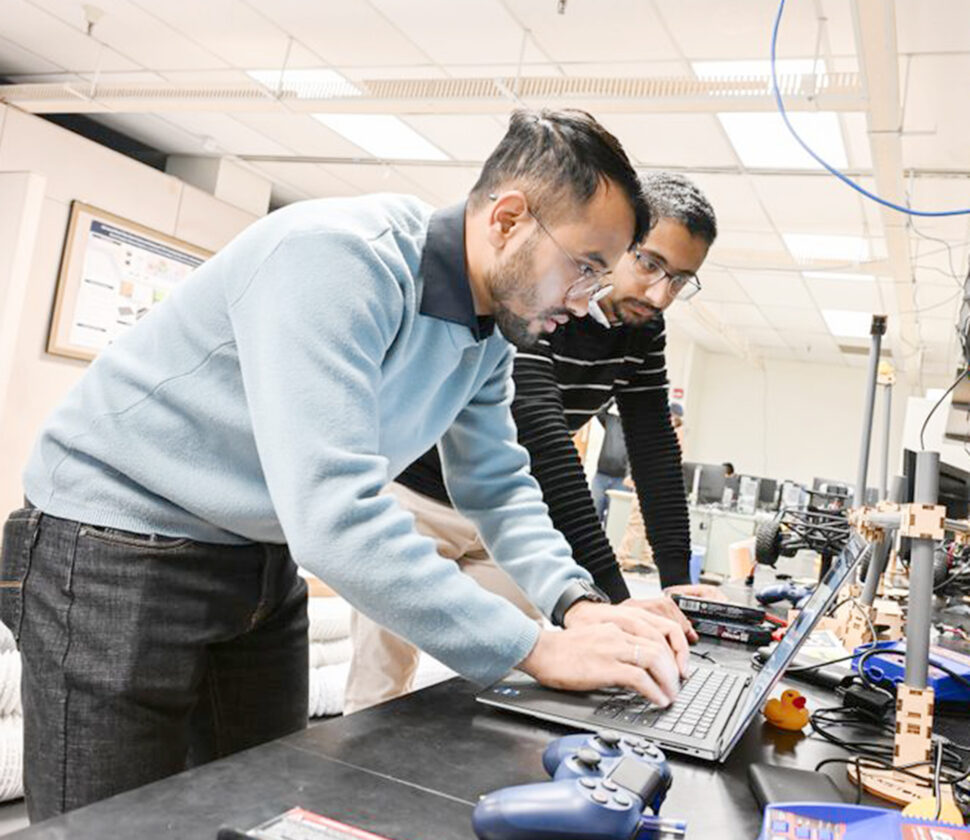New program focuses on artificial intelligence

WVU photo New course offerings in artificial intelligence at the Statler College are expanding research and hands-on experiential learning possibilities across several disciplines.
MORGANTOWN –The West Virginia University Board of Governors has approved a new online MS degree in Artificial Intelligence, launching at the Benjamin M. Statler College of Engineering and Mineral Resources. Housed in the Lane Department of Computer Science and Electrical Engineering (LCSEE), the program offers students a robust curriculum in AI, machine learning, computer science and data science topics.
“Our goal is to empower students with advanced expertise in AI, machine learning and data science to prepare them for dynamic careers in research, high-impact industries or graduate studies,” LCSEE chair Anurag Srivastava said. “We also aim to elevate WVU’s leadership in artificial intelligence by promoting interdisciplinary research, expanding strategic partnerships and workforce development in transformative technology fields.”
Along with the new MS degree, new certificates and concentrations for both undergraduates and grad students provide opportunities to explore AI developments and applications in other engineering disciplines.
Here’s a closer look at all the new offerings shaping the future of engineering education:
Advanced graduate
offerings
Through a new online MS degree in Artificial Intelligence approved by the BOG in June, students will have the opportunity to continue coursework in theory and applications of AI. The program’s development was spearheaded by LCSEE associate chair and professor Donald Adjeroh along with LCSEE lecturer Don McLaughlin. Adjeroh emphasized AI’s rapid expansion across industries as a catalyst for the new program.
The new MS in AI degree program is a timely and significant addition to Statler’s online offerings,” said Ashish Nimbarte, IMSE chair and Statler Online Programs director. “The AI curriculum provided by this program will cultivate a new generation of AI experts and also benefit students from other programs with diverse backgrounds who want to become AI proficient by taking structured elective courses aligned with their career goals.
“That AI will significantly re-shape the workplace of the future is a given,” explained Adjeroh. “What is not clear is exactly how. The new program provides the required training for students with diverse backgrounds to understand the foundations behind AI, and how to build on that understanding to address key challenges in their specific field — positioning them for effective response to the expected changes in the workplace prompted by the ongoing AI revolution.”
Program highlights:
— 30 credit hours
— Flexibility for both part-time and accelerated paths
— Ability to graduate in one to three years
— Access to unique and relevant electives
— Reasonable cost
— Fully-online delivery for working professionals and non-traditional students
— Balanced foundational and applied AI topics
“This initiative responds to a sharp demand for AI-proficient professionals in digital health, cybersecurity, robotics, energy systems, and emerging automation fields, aligning with WVU’s mission to advance impactful technological innovation,” Srivastava said. “This program was shaped through input from industry partners, national priorities, alumni, and faculty expertise, ensuring the program addresses real-world needs while positioning graduates for leadership in AI-driven sectors.”
Students are eligible to enroll for the Spring 2026 semester. For additional information on how to apply, visit: http://catalog.wvu.edu/graduate/collegeofengineeringandmineralresources/thelanedepartmentofcomputerscienceandelectricalengineering/artificialintelligence/
Graduate Certificate
in Digital Health
The Digital Health program provides students with a technical foundation in artificial intelligence, machine learning and data science to address challenges in human health and healthcare. Students will learn to apply, evaluate and innovate with digital technologies to improve healthcare delivery, outcomes and system efficiency. More information can be found at: http://catalog.wvu.edu/graduate/graduatecertificates/digital_health/
New Areas of
Emphasis
Led by LCSEE graduate studies director Muhammad Choudhry, these new concentrations were developed in coordination with faculty to align with emerging industry needs. These focus areas produce career-ready graduates who are technically proficient and immediately relevant across emerging AI and engineering landscapes:
Artificial Intelligence and Computational Data Science: This is a structured track for LCSEE students, offering focused coursework in AI, machine learning, theory of computing and data analytics to complement hands-on engineering and strengthen readiness for AI-centric roles.
Cyber-Physical and Complex Systems: Emphasizes the integration of computing, sensing, signal processing and control in real-world systems like automation, robotics, smart grids and energy systems.
Cybersecurity and Networked Systems: Prepares engineers and computer scientists in wireless communication systems and software, networking and hardware security, defensive architectures and secure systems design.
Microelectronics and Embedded Systems: Focused on design and implementation of microchips, sensing electronics, digital devices, Internet of Things and resource-efficient embedded platforms.
Computer science and electrical engineering students are eligible for these focus areas.
Innovative
undergraduate
program additions
Statler is proud to offer undergraduate students even more pathways to success through new interdisciplinary offerings. From artificial intelligence to robotics and data science, these new collaborations are designed to meet the demands of today’s rapidly changing industries and equip future engineers with the skills and experience to lead.
Two new dual degree programs will straddle LCSEE and the Mechanical, Materials and Aerospace Engineering department:
B.S. in Computer Engineering + Robotics Engineering
B.S. in Computer
Science + Robotics
Engineering
These new interdisciplinary programs require 152-153 credit hours and offer students a unique opportunity to gain deep expertise in both computing and intelligent machine design — preparing them for high-impact careers at the intersection of AI, automation and advanced technology.
New area of emphasis:
Artificial Intelligence
Coordinated by LCSEE teaching associate professor and computer science undergraduate studies program director Brian Powell, this undergraduate AI track offers focused coursework in AI, machine learning and data analytics to complement hands-on learning and strengthen readiness for AI-centric roles like AI/ML engineer, data analyst, AI product associate, automation engineer and junior data scientist.
Students in the following majors are eligible:
— Computer science
— Electrical engineering
— Computer engineering
— Cybersecurity
— Robotics engineering
New department-led initiatives, resources
LCSEE is home to several growing initiatives and AI applications in research, student-led experiential learning and collaborations across disciplines:
In collaboration with WVU Health Sciences, the AI + Digital Health Engineering Center advances interdisciplinary research and innovation at the intersection of artificial intelligence and healthcare.
Supported by the National Science Foundation, the NRT Digital Health program cultivates a new generation of interdisciplinary leaders proficient in AI, data analytics and healthcare innovation.
Thanks to faculty expertise, rigorous curriculum and institutional depth in cyber defense education and research, WVU holds the prestigious Center of Excellence in Cybersecurity from the Department of Homeland Security and National Security Agency.
The new IDEMIA Biometrics Lab provides opportunities for hands-on learning in biometrics, identity and access technologies. The lab joins the Trilogy Cybersecurity and Morey Energy Systems labs on the Evansdale campus to expand experiential learning and research initiatives here at Statler.
Students innovate with AI
Student competition teams across disciplines are earning recognition with cutting-edge projects including:
WVU’s AI-powered F1Tenth team is driving innovation with their autonomous car, which placed second in last year’s Institute of Electrical and Electronics Engineers international competition.
For EcoCAR competitions, students are utilizing AI-driven simulations and control systems to optimize energy efficiency, predictive diagnostics and driver behavior models.
Over the past three years, the WVU Mars Rover competition team has earned two second-place finishes and one first-place win. AI applications have included autonomous path planning and navigation across simulated terrain using onboard planning systems, computer vision and LiDAR-guided obstacle detection, target identification and manipulation during mission tasks.



